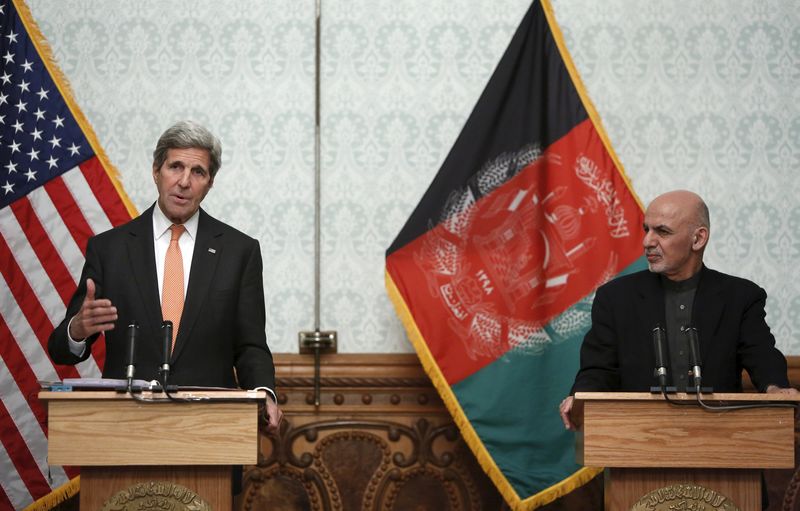By Arshad Mohammed and James Mackenzie
KABUL (Reuters) - U.S. Secretary of State John Kerry made an unannounced trip to Afghanistan on Saturday to show support for the government and to try to defuse a political crisis fuelled in part by a national unity deal he brokered in 2014.
The visit comes at a difficult moment for Afghanistan, with President Ashraf Ghani's government weakened by infighting between political rivals, the economy sinking and the resurgent Taliban stronger than at any time since they were toppled from power in late 2001.
State Department spokesman John Kirby said Kerry would "emphasise U.S. support" for the government and its security forces, which NATO officials say fully control no more than 70 percent of Afghanistan.
U.S. forces in Afghanistan are due to be almost halved to 5,500 from the current 9,800 by the start of 2017, and the new commander in Afghanistan, General John Nicholson, is conducting a review of security before making his recommendations to Washington some time in June.
In addition to showing support for the government, the visit also appears aimed at prodding Afghanistan's fractious political class into working more productively.
"Democracy requires ... a willingness by people from various political, ethnic and geographic factions to put away those factional divisions and work together for the common good," Kerry said at the start of the U.S.-Afghanistan bilateral commission with Afghan Foreign Minister Salahuddin Rabbani.
Kerry met Nicholson and spoke to a small number of U.S. troops at the heavily guarded NATO headquarters in Kabul.
DISPUTED ELECTION
He was also scheduled to meet Ghani, the victor of Afghanistan's disputed 2014 election, and Chief Executive Abdullah Abdullah, the runner-up. The pair share power under the 2014 National Unity Government agreement.
The political deal that Kerry brokered suggested that their power-sharing arrangement would end in September 2016, which has fuelled political manoeuvring in Kabul. An opposition movement close to former president Hamid Karzai is pushing to have a say on the way forward.
The legal decree that enacted the deal, however, provided no clearly binding time limit, leaving open the possibility that the National Unity government, in one form or another, could continue for the rest of Ghani's five-year mandate.
Kerry is expected to make that point while in Afghanistan, a stance that U.S. officials hope may help quell some of the infighting.
"Though the political agreement calls for this to be a two-year agreement, the decree doesn't spell out an end date," said a senior U.S. official on condition of anonymity. "We ourselves here don't view that there is going to be an end ... in September."
U.S. special representative for Afghanistan and Pakistan Richard Olsen made a similar point more obliquely with reporters in Washington on Monday.
"The Secretary wants to signal continuing U.S. support for the national unity government," he said. "It's at the 18-month mark in a five-year term."
In Warsaw in July, the NATO Western security alliance is expected to decide how to fund Afghanistan's security forces in the coming years and donor nations will gather in Brussels in October to make civilian aid pledges to Afghanistan.
Kerry said U.S. and Afghan officials needed "to make certain that we use the time between now and the meeting in Warsaw and the meeting in Brussels to make sure that we are putting Afghanistan’s best foot forward".

Noting the dates, Andrew Wilder, an Afghanistan expert at the United States Institute for Peace think tank, said "the last thing we need is a big political crisis calling into question the legitimacy of the national unity government in September".